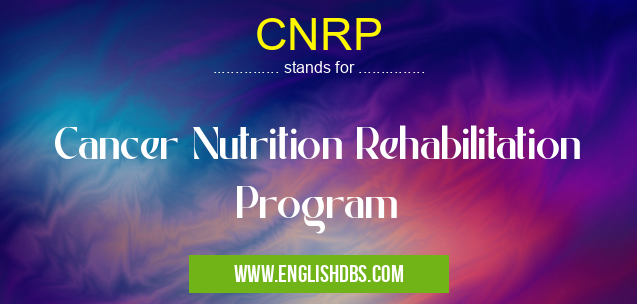What does CNRP mean in REHABILITATION
CNRP stands for Cancer Nutrition Rehabilitation Program. It is a comprehensive program designed to address the nutritional needs of cancer patients before, during, and after treatment. The goal of CNRP is to improve the patient's quality of life, optimize treatment outcomes, and prevent or mitigate nutritional complications.

CNRP meaning in Rehabilitation in Medical
CNRP mostly used in an acronym Rehabilitation in Category Medical that means Cancer Nutrition Rehabilitation Program
Shorthand: CNRP,
Full Form: Cancer Nutrition Rehabilitation Program
For more information of "Cancer Nutrition Rehabilitation Program", see the section below.
Key Components of CNRP
- Nutritional Assessment: A thorough evaluation of the patient's nutritional status, including dietary intake, anthropometric measurements, and laboratory tests.
- Individualized Nutrition Plan: Development of a tailored nutrition plan based on the patient's specific needs, dietary preferences, and treatment plan.
- Nutrition Education and Counseling: Provision of guidance and support to help patients understand the role of nutrition in cancer care, make healthy dietary choices, and manage side effects.
- Nutritional Supplementation: As needed, provision of nutritional supplements to ensure adequate intake of essential nutrients.
- Symptom Management: Assistance with managing nutrition-related side effects of cancer treatment, such as nausea, vomiting, and diarrhea.
- Monitoring and Evaluation: Regular monitoring of the patient's nutritional status and progress to ensure the effectiveness of the program.
Benefits of CNRP
- Improved nutritional status
- Reduced risk of malnutrition
- Enhanced treatment tolerance
- Improved quality of life
- Reduced risk of complications
Essential Questions and Answers on Cancer Nutrition Rehabilitation Program in "MEDICAL»REHABILITATION"
What is the Cancer Nutrition Rehabilitation Program (CNRP)?
The CNRP is a specialized program designed to address the nutritional needs and challenges faced by individuals undergoing cancer treatment. It aims to optimize their nutritional status, improve their overall health, and enhance their quality of life during and after treatment.
What types of services are included in the CNRP?
The CNRP typically offers a comprehensive range of services, including:
- Nutritional assessment and counseling
- Development of personalized nutrition plans
- Monitoring and tracking of nutritional progress
- Management of treatment-related side effects that impact nutrition, such as nausea, vomiting, and taste changes
- Education and support on healthy eating and lifestyle habits
- Collaboration with other healthcare professionals involved in the patient's care
Who is eligible for the CNRP?
Individuals diagnosed with cancer who are experiencing nutritional challenges or are at risk of malnutrition are typically eligible for the CNRP. This includes patients undergoing chemotherapy, radiation therapy, surgery, or other cancer treatments that can affect their nutritional status.
How can I access the CNRP?
The CNRP is typically offered through hospitals, cancer centers, or specialized clinics. Individuals can consult with their oncologist or healthcare provider to determine if the CNRP is available at their treatment facility.
What are the benefits of participating in the CNRP?
Participating in the CNRP can provide numerous benefits for individuals with cancer, including:
- Improved nutritional status and reduced risk of malnutrition
- Enhanced energy levels and overall well-being
- Reduced treatment-related side effects
- Improved quality of life during and after treatment
- Increased adherence to treatment plans and better overall health outcomes
Final Words: CNRP is an essential component of comprehensive cancer care. By addressing the nutritional needs of patients throughout their treatment journey, CNRP can significantly improve outcomes and enhance the patient's overall well-being.
